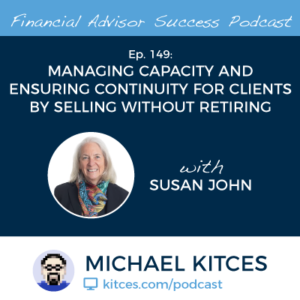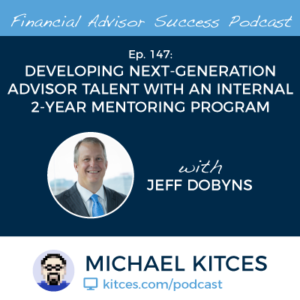 Welcome back to the 149th episode of Financial Advisor Success Podcast!
Welcome back to the 149th episode of Financial Advisor Success Podcast!
My guest on today's podcast is Susan John. Susan is a financial advisor and the managing director of financial planning for F.L.Putnam, an independent RIA with offices across New England that manages more than $2 billion of assets under management.
What's unique about Susan, though, is that she only just recently joined F.L.Putnam having spent nearly 25 years building her own independent financial planning firm from scratch up to $350 million in assets under management before deciding to tuck into F.L.Putnam as part of her succession but not retirement plan.
In this episode, we talk in depth about the financial planning process that Susan has developed over more than three decades of experience, which now is done on an interactive basis using eMoney Advisor, where clients don't even ever receive a big printout but just a summary of recommendations, pros and cons, and the firm's rationale for the recommendations it's making; why Susan chooses to charge a full upfront fee of $3,500 to $15,000 to do these financial planning snapshots for every client before even considering whether to take them as an ongoing AUM client; and how, on an ongoing basis, Susan starts every year with an annual cash plan that evaluates exactly how each retired client's retirement paychecks will be generated from their portfolio for the coming year, given both their cash flow needs and the current portfolio and tax situation.
We also talk about how Susan grew her advisory firm to $350 million by proactively asking for referrals and running intimate client events, including entire weekend ski getaways to deepen those client relationships. How Susan expanded ownership of the firm over the years with buying opportunities to several of the firm's employee advisors, and why, for the sake of her firm's fiduciary duty to clients, she ultimately decided to sell externally and tuck into a larger advisory business rather than continuing to transition succession equity to her existing advisor partners internally.
And be certain to listen to the end, where Susan shares why she has become increasingly active in the financial planning profession with leadership roles in both NAPFA and the CFP Board, how she structures her week to try to balance her obligations within the firm and beyond, and why Susan views it as imperative for both newer and established financial advisors to join and get actively involved with one of the industry's membership associations.

 Welcome back to the 148th episode of Financial Advisor Success Podcast!
Welcome back to the 148th episode of Financial Advisor Success Podcast! Welcome back to the 147th episode of Financial Advisor Success Podcast!
Welcome back to the 147th episode of Financial Advisor Success Podcast!
